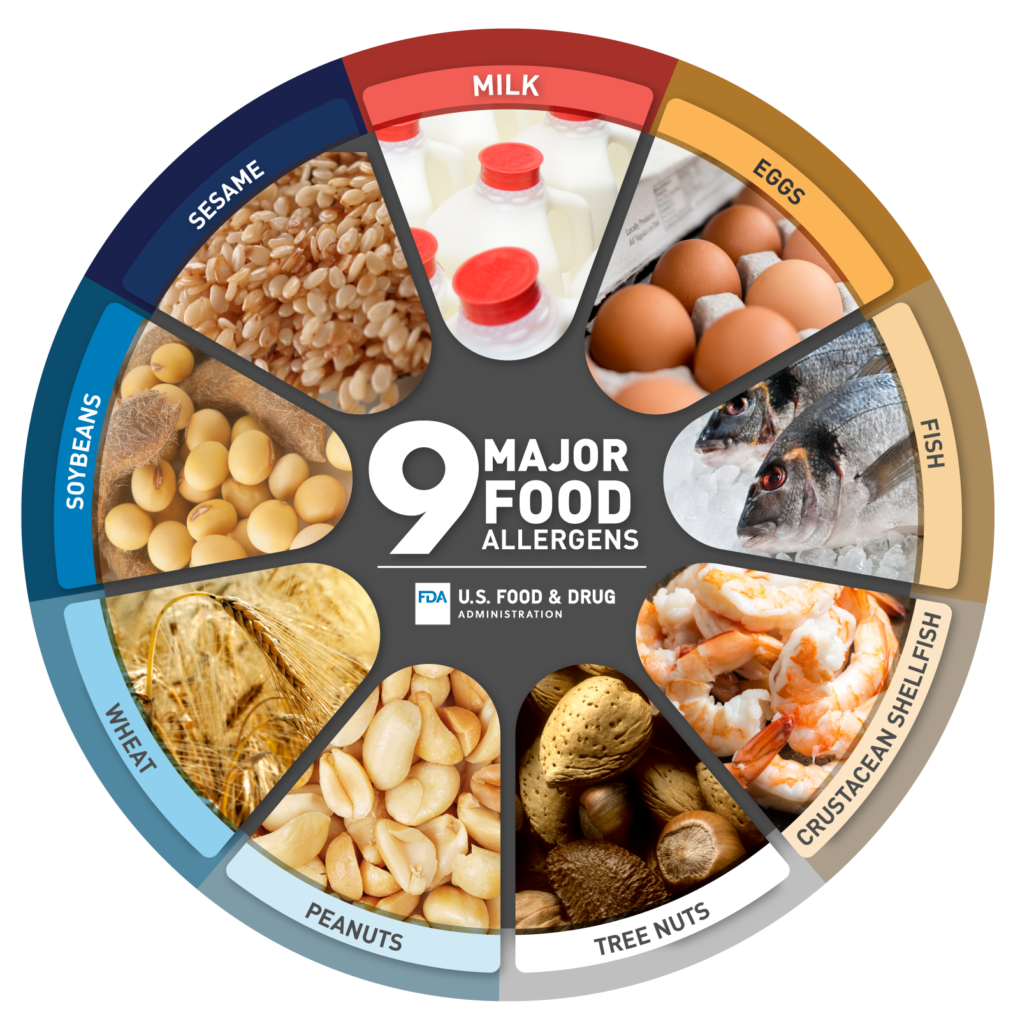
Are food intolerances or allergies messing with your meals and quality of life? Get the lowdown on what’s what, and some simple tips for keeping them in check.
Disclaimer
The content on this website is intended for informational purposes only, and is not a substitute for professional medical advice, diagnosis, or treatment. Discuss any information from this website with a qualified healthcare provider or licensed medical professional to determine its relevance and suitability for your individual health needs.
Eating with Food Intolerances – Shazia’s Story
Figuring out what to eat can be challenging if you have food intolerances or allergies.
Take my cousin Shazia (not her real name) for example. She is always struggling with digestive issues.
Shazia’s gut health got really bad about two or three years ago. Symptoms like bloating, heartburn, severe stomach pain, nausea, and constipation were disrupting her daily life.
She tried all the conventional treatments available. The medicines help for a while, but when she stops taking them, she’s back to where she started.

Feeling frustrated, she started to look for answers, like many of us, on Google, YouTube, TikTok, and other social media sites to figure out why she was having so many stomach issues and how to fix them.
Among the things she discovered, she thought trying probiotics or digestive enzymes could help. But nope, they didn’t do the trick either.
Discovering the Culprits
Finally, recently, Shazia found the answer she was looking for so desperately.
A food sensitivity test (blood test) showed that she is highly intolerant to gluten, dairy, eggs, mushrooms, and tree nuts like almonds, cashews, pistachios, and walnuts.

Source: iStock
Growing up in an Indian household, gluten-rich foods like samosas, naan, chapatti, and many others were staples of her daily diet.
It never once occurred to her that these everyday foods could be causing her digestive problems. So, the link between them and her health problems came as a surprise.
And about the dairy, eggs, mushrooms, and tree nuts?
Funny enough, Shazia was eating those regularly. She thought that she was doing her body a favour since everyone says they’re supposed to be good for you.
But those foods were causing her all sorts of discomfort, because it was difficult for her digestive system to break them down.
Clearing the Confusion
Food Intolerance is the same as Food Allergy, right?
Well, not really.
People often get food intolerance and food allergy mixed up, because both can make you feel bad after eating certain foods. Their causes, symptoms, and treatments are very different, though.
What is a Food Intolerance?
When it comes to food intolerance, the main issue is how it messes with your digestion. But generally, it’s not as serious as an allergy. It does not involve the immune system (the immune system helps protect us from germs, viruses, and other harmful things that can make us sick).
Food intolerance means your digestive system has trouble processing certain foods, making you feel pretty bad. But it’s not going to trigger a severe immune response.
Common Causes of Food Intolerance
The usual culprits behind food intolerance include:
- Not having the right enzyme to break down a food, which is what happens with lactose intolerance
- Celiac disease, where gluten is the problem, but unlike allergies, it doesn’t lead to anaphylaxis
- Adverse reactions to additives and preservatives found in some foods
- Digestive conditions like irritable bowel syndrome (IBS)
- Chronic stomach problems and bacterial overgrowth (also known as Candida Overgrowth)
What is a Food Allergy?

Source: Food and Drug Administration, Department of Health and Human Services, USA
Allergies involve the immune system. A food allergy is when your immune system (your body’s defences) reacts unusually to certain foods, thinking that a food or something in a food is a “danger” to your health. Your body responds to the food (an allergen) by having an allergic reaction.
Food allergies rarely kill, but it is possible. Anaphylaxis is an extreme allergic reaction that needs medical help right away. Most of the time, anaphylaxis is caused by foods (like peanuts, tree nuts, seafood, wheat, milk, and eggs), insect bites and stings. Some medicines can cause allergic reactions, too.
Within minutes of being exposed to the allergen, one can start to have symptoms that could be life-threatening. In such situations, using epinephrine (a lifesaving emergency medicine) right away could save a person’s life.
Who Gets Food Allergies?
Anyone can have a food allergy, but some things make it more likely for them to happen.
• Family history
A person is more likely to get food allergies if they have close family members with asthma or any allergic diseases, such as eczema, food allergies, or seasonal allergies.
• Medicines
It has been shown that medications used to treat the following conditions raise the chance of food anaphylaxis:
– High blood pressure
– High cholesterol levels (abnormally high levels of fats in the blood)
– Digestive problems (acid-neutralising medication)
– Pain (drugs like ibuprofen)
• Gut bacteria
According to studies, those who are allergic to nuts or suffer from seasonal allergies have different gut bacteria. Scientists are looking into whether changing the bacteria that live in the gut could help stop or manage allergies.
• Stress
Constant stress keeps stress hormones like cortisol high. This can weaken your immune system and make food allergies more likely.
Shazia’s Symptoms: Intolerance vs Allergy
Let’s take Shazia’s situation to clear the confusion between food intolerance and allergy.
Food intolerances mostly affect the digestive system, and make you feel bad after eating certain foods. Shazia has been having following symptoms because of her food intolerances:
- Bloating
- Acid reflux
- Severe stomach pain
- Constipation
- Diarrhoea
- Gas
- Nausea
Now, let’s assume that Shazia was allergic to those specific foods. Her immune system would have reacted negatively if she ate any of those foods since she was allergic to them. This reaction could have been severe, even deadly.
For her, the following could have been the symptoms of serious food allergies:
-
- Wheezing
- Swelling of the lips, tongue, or throat
- Itching inside the mouth, throat, or ears
- Coughing
- Stomach cramps
- Anaphylaxis, which needs medical help right away
- Runny nose
- Hives or skin rash
- Vomiting
- Diarrhoea
- Seizures
While both can make you feel lousy, food intolerances and allergies affect your body differently.
Managing Food Intolerances
Food intolerances might not be as serious as food allergies. Still, they can hurt your quality of life. Follow these steps to help manage your condition:
 Source: iStock
Source: iStock
1. Identify trigger foods
It may require some trial and error and keeping a food diary to pinpoint which foods are causing the discomfort.
2. Elimination diet
Stop eating the foods you think are making you uncomfortable, see if your symptoms get better, and slowly start eating them again to pinpoint the culprit.
3. Get help from a nutrition expert
Instead of figuring it all out yourself, having a pro create a diet plan just for you can make things easier.
4. Be a label reader
Read food labels carefully, and stay away from possible triggers when you’re grocery shopping.
5. Eat out cautiously
Eating out can be difficult when you don’t have control over the ingredients. You can still have a fun night out without harming your health, though.
While eating out, try checking the menu beforehand or calling the restaurant to find out about the ingredients. With a little extra effort and awareness, you can still enjoy dining out while prioritising your health.
Managing Food Allergies
We understand by now that severe allergic reactions can be life-threatening. So, if you think you may have a food allergy, it is important to take an active role in managing it.
Source: iStock
As food allergies can’t be cured, the only way to avoid a reaction is to strictly avoid the foods you are allergic to.
• Carefully read food labels and restaurant menus to make sure that they don’t have any of the foods you’re allergic to on them.
• Make sure your family, friends and colleagues know about your food allergy.
• Always carry epinephrine with you.
It is also important to talk to your doctor. They will do some tests, and advise you based on the results. Your doctor might give you medicine to help with allergy symptoms, like:
• Epinephrine (like EpiPen® or Auvi-Q) for quick help during serious allergy attacks.
• Antihistamines to lessen itching or stuffiness.
• Corticosteroids to lower swelling from bad allergic reactions.
Key Takeaways
It can be tough to deal with food intolerances and allergies, but many people are going through this.
As far as Shazia is concerned, she is following the five steps that we talked about above in the Managing Food Intolerances section. Even though she originally felt frustrated and overwhelmed, her journey of identifying and managing her food intolerances shows the importance of being informed, getting an accurate diagnosis, and customising our diets to suit our needs.
It’s also important to know how serious food allergies can be, because they need quick care, and a different way of handling them to stay safe.
If you have uncomfortable symptoms, consider contacting your doctor or nurse. They can advise you on what to do next, and help you figure out which things upset your stomach.
Further Reading
I’ll write a more in-depth article about this topic. Meanwhile, here are a few links if you want to dig deeper:
1. https://www.ncbi.nlm.nih.gov/pmc/
articles/PMC9853442/
2. https://www.niaid.nih.gov/diseases-conditions/risk-factors-food-allergy
3. https://enews.aaaai.org/november-2013/news-briefs/cdc-releases-guidelines-for-managing-food-allergies-in-schools






